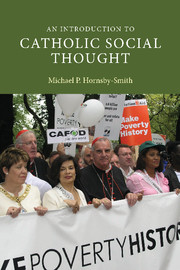Book contents
- Frontmatter
- Contents
- List of tables and figure
- Acknowledgements
- Dedication
- List of abbreviations and acronyms
- PART I SOCIAL REALITY AND SOCIAL ANALYSIS
- PART II THEOLOGICAL RESOURCES
- 3 The kingdom of God
- 4 Christian citizenship
- 5 Catholic social thought
- PART III JUSTICE ISSUES
- PART IV ACTION RESPONSES
- Appendix: Selected campaigning organizations
- References
- Index
5 - Catholic social thought
Published online by Cambridge University Press: 14 January 2010
- Frontmatter
- Contents
- List of tables and figure
- Acknowledgements
- Dedication
- List of abbreviations and acronyms
- PART I SOCIAL REALITY AND SOCIAL ANALYSIS
- PART II THEOLOGICAL RESOURCES
- 3 The kingdom of God
- 4 Christian citizenship
- 5 Catholic social thought
- PART III JUSTICE ISSUES
- PART IV ACTION RESPONSES
- Appendix: Selected campaigning organizations
- References
- Index
Summary
INTRODUCTION
This chapter offers an introduction and outline of Catholic social thought as it has developed since the time of Jesus who did not have to address such contemporary issues as the morality of nuclear deterrence, or the Common Agricultural Policy, or international debt, or global warming or genetic engineering. It offers brief reflections on the place that natural law thinking has in Catholic social thought. It then outlines some key historical developments particularly since Leo XIII's encyclical Rerum Novarum in 1891. Six key principles of Catholic social thought, around which there is much consensus, are then suggested. This is followed by an evaluation of the strengths and weaknesses of this body of thought. The chapter concludes with an overview of the theological resources suggested in Part II of this book and available for reflection on the six main areas of injustice to be considered in Part III.
One of the first things to note about Catholic social thought is that it is not static but dynamic in response to changing circumstances and needs. Indeed, on certain matters, such as democracy, co-ownership, human rights and conscientious objection, earlier positions have been reversed. Secondly, Catholic social thought for the past century and a half has sought to articulate a path between statist socialism and liberal capitalism and has insisted that the economy is to serve the needs of people.
- Type
- Chapter
- Information
- An Introduction to Catholic Social Thought , pp. 85 - 114Publisher: Cambridge University PressPrint publication year: 2006

